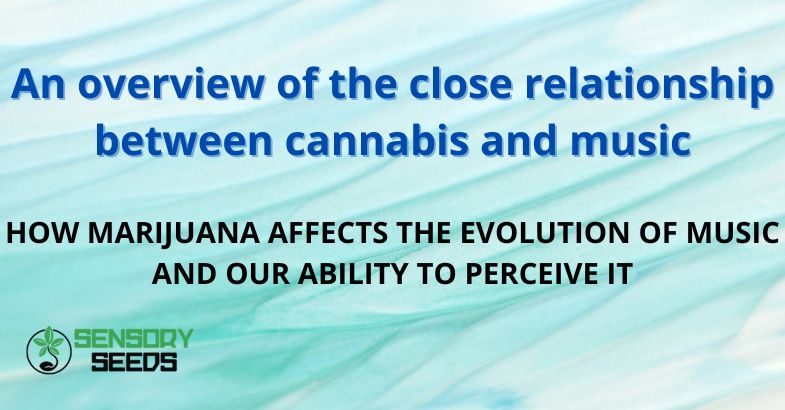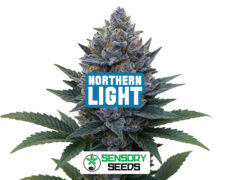Published on: 12/10/2023
HOW MARIJUANA AFFECTS THE EVOLUTION OF MUSIC AND OUR ABILITY TO PERCEIVE IT
Marijuana played a pivotal role in the history of music, influencing the creation of musical genres and art movements throughout the 20th century, and continues to have a decisive impact today. It has often been associated with creativity and the ability to step outside the box, to stimulate a unique inspiration in those who produce music and to allow those who listen to it to experience sensations not accessible to those who do not use it.
But how much of this is true? How does cannabis relate to music and how does it affect the creative process behind the success of so many artists and the ability of the public to fully enjoy their creations?
We will try to answer these questions in the following article.
The role of marijuana in the creation of musical genres and art movements
The history of marijuana in music dates back to the 1920s, when it was introduced into popular music, especially jazz.
Cannabis allowed musicians to improvise more effectively, apparently also thanks to its effect on the perception of tempo (and consequently musical tempos), stimulating creativity and inspiration. Since then this plant has been closely linked to many other genres which have often made it a symbol of rebellion and freedom, also favoring the association of marijuana with youth culture and nonconformity.
This plant has played a significant role in creating musical subcultures and art movements. For example, the 1960s psychedelic rock era was characterized by the use of psychoactive substances such as cannabis, which inspired artists such as Jimi Hendrix, The Beatles and Pink Floyd to explore new musical territories. And, of course, in this dynamic reggae occupies a place of absolute importance. The genus, originally from Jamaica, and its most famous icon, Bob Marley, are closely associated with marijuana use and Rastafarian philosophy, which views cannabis as a means of elevating consciousness and connecting to a higher spiritual plane.
Cannabis is considered a creative stimulant by musicians, as some strains such as sativa act on the mind and stimulate creativity. This substance would allow the listener to immerse themselves exclusively in the music, triggering a ‘hyper-priming’ which can lead to a more creative interpretation of the lyrics by the listeners, as well as an increase in creative output by the musicians themselves. This effect has been exploited by many artists, who have made marijuana a source of inspiration and creativity.
Weed is still very present in pop culture and the music industry today, and many artists are known to use it (or have done it in the past). Among these we can mention Snoop Dogg, Wiz Khalifa, Rihanna, Lady Gaga and the entire Marley family. Not to mention Willie Nelson, one of the most influential icons who smoked marijuana and wrote music for decades, tying the drug to his love life, his art and his career.
But, at this point, a question arises: all this talk of an alleged ‘creative power’ of cannabis, according to some a very strong source of inspiration for those involved in music and also for those who listen to it, has some foundation, Or is it just beliefs without any basis?
We explore this theme by addressing the effects of music on our brain and the relationship between the latter and the intake of marijuana in the following paragraphs.
Read also:Everything you need to know about cannabis tincture


Music: an art with positive effects on the central nervous system and concentration
Music exerts a timeless fascination on humanity.
In addition to being a pleasure for the ears, it has been shown to have positive effects on the entire central nervous system. In fact, the human brain is forced to process pitch, rhythm, harmony and timbre to fully understand music, and all this requires a large amount of mental work, which results in an increase in activity cerebral.
These effects have been the subject of numerous scientific studies. For example, research conducted by the University of Helsinki has shown that listening to music activates the same areas of the brain involved in understanding language, positively affecting our ability to communicate with others.
In addition, beneficial effects have also been found on memory. Indeed, a study conducted by the University of Edinburgh has shown that listening to music can improve short-term memory. Participants listened to a series of words and then repeated them in reverse order: those who listened to music had a 20% improvement in their ability to remember the words compared to the others.
Further studies have even shown that music can improve mood, reduce stress and increase our ability to concentrate – effects we all experience daily when we relax to listen to our favorite singers and genres. And science has confirmed them, removing any doubts about the potential of music in the general improvement of the quality of life.
The effects of cannabis on the perception of time and music
In recent years, the legalization of cannabis in many countries has led to an increase in interest in its effects on our bodies. Among these, one of the most interesting concerns its ability to inhibit the activity of the hippocampus, a brain region involved in memory and spatial navigation.
But what does all this have to do with our perception of time and music?
You see, when we take cannabis, this plant acts on the cannabinoid receptors present in our brain, inhibiting the activity of the hippocampus and altering our perception of time. In particular, it seems to make you focus more on the present moment, while making it less easy to memorize long-term information. This effect can be useful in some situations, for example when you need to focus on a creative activity for which the ‘here’ and ‘now’ play a central role.
But let’s briefly analyze the effects of marijuana on the perception of music.
Also in this case, the properties of the plant are quite interesting. On the one hand, cannabis appears to increase the ability to discern musical notes, improving the ability to distinguish between various sound frequencies. An effect apparently confirmed by numerous artists who claim to experience an improvement in their listening and performing skills following the intake of marijuana.
On the other hand, cannabis also appears to influence the complexity of music that the body is able to tolerate. Some studies, in fact, would have shown that, under the effect of this substance, the brain is led to appreciate more articulated and elaborate pieces than the average.
However, it is important to point out that the properties mentioned so far can vary from person to person and also depend on the amount and type of cannabis consumed. Furthermore, the plant is also known to have negative effects on short-term memory and the ability to concentrate, sometimes making it difficult to perform complex activities such as playing a musical instrument.
The effects of CBD and THC on listening to music: these are the differences
In 2018, IJNP, or the International Journal of Neuropsychopharmacology, conducted an in-depth study to monitor what happens in the brain when a person is exposed to cannabis and music.
Now, to understand the results of the study that we will present shortly, it is important to distinguish the main difference between THC and CBD.
The former is responsible for the feeling of ‘high’ and is psychoactive, while the CBD is not. Both exert a variety of effects on the brain and body, sometimes even in conflicting ways.
In the study, three groups of patients were examined: one under the influence of cannabis with THC, one with both CBD and THC, and one with a placebo.
Contrary to the expected results, the co-administration of CBD and THC effectively attenuated the effects of music in the reward-sensitive and emotion-sensitive brain region. Basically, this means that the activity of the reward system and the emotional response system appeared to be lower than in the other groups.
This result surprised the same researchers who expected a much greater impact of cannabis on the music listening experience. On the other hand, it is known that marijuana interacts with the release of dopamine, enhancing the sensations of pleasure we experience in carrying out actions we like, such as listening to music.
But then, why did the study cited above give a result that seems to prove the opposite?
There is a possible explanation.
THC is known to interfere with the reward system and possibly affected related neurotransmitters. However, cannabis with both THC and CBD had no difference versus placebo in terms of monitored neural activity.
This essentially means that cannabis with THC and CBD probably does not alter the reward and emotional systems to the same extent as cannabis with THC alone. Translated: tetrahydrocannabinol is able to increase the pleasure in listening to music, while cannabidiol, in the light of the facts, seems to reduce this effect, acting as an antagonist of THC.
In conclusion
Marijuana had, and still has, a profound and lasting impact on music and its evolution, contributing to the emergence of musical genres and art movements. Its influence on creativity, inspiration and perception of music is undeniable and, on closer inspection, it also seems to be confirmed by scientific research, especially as regards THC which, as we have seen, positively affects the listening experience.
These considerations, of course, must be considered net of the known negative effects that tetrahydrocannabinol can exert, such as short-term memory loss, the blurring of the senses and, last but not least, the strong sense of dependence that it can cause in those who take it .
Ultimately, however, we can say that marijuana remains an important muse for many artists, and its role in the development of music and in our ability to perceive it is and will be a fascinating and complex topic to analyze.
Do you want to stay up to date on the world of cannabis? Continue to follow our blog and our dedicated articles! And if you are an avid collector, take advantage of the quality products that you can find in our shop: on SensorySeeds you will find many types of marijuana seeds perfect for a lover like you.


CANNABIS AND MUSIC TAKEAWAYS
Cannabis has played a significant role in the creation of musical subcultures and artistic movements, mainly due to its effect on the creativity and inspiration of musicians.
Marijuana has often been used as a symbol of rebellion and freedom, and has helped tie youth culture to nonconformity.
Cannabis has influenced many musical genres, most notably 1960s psychedelic rock and reggae, which has made it a staple of his Rastafarian philosophy.
Some cannabis strains, such as sativa, are considered a creative stimulant by musicians and could enhance the creativity and inspiration of artists.
Cannabis intake can affect the perception of music, improving the ability to discern musical notes and leading to a greater appreciation of more articulated and elaborate pieces. However, it is important to note that the effects of the plant can vary from person to person and depend on the amount and type of cannabis ingested.
CANNABIS AND MUSIC FAQ
What is the role of marijuana in the creation of musical genres and art movements?
Marijuana has played a significant role in creating musical subcultures and art movements, inspiring artists to explore new musical territories and becoming a symbol of rebellion and freedom.
What are the positive effects of music on our central nervous system?
Listening to music has been shown to have positive effects on the entire central nervous system, improving our ability to communicate with others, short-term memory, mood, stress reduction and increasing our ability to concentration.
What are the differences between the effects of CBD and THC on listening to music?
THC, responsible for the sensation of “high”, is able to increase the pleasure of listening to music, while CBD seems to reduce this effect, acting as an antagonist of THC. In a study conducted by the International Journal of Neuropsychopharmacology, the simultaneous administration of CBD and THC effectively attenuated the effects of music in the brain region sensitive to reward and emotions.









